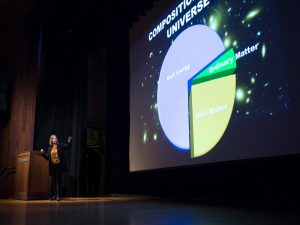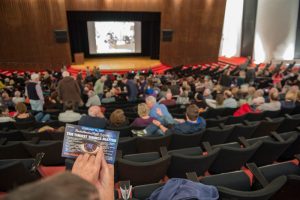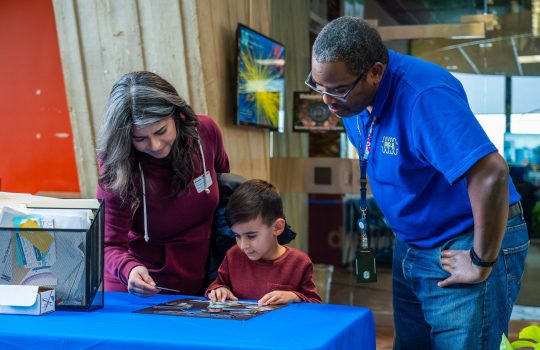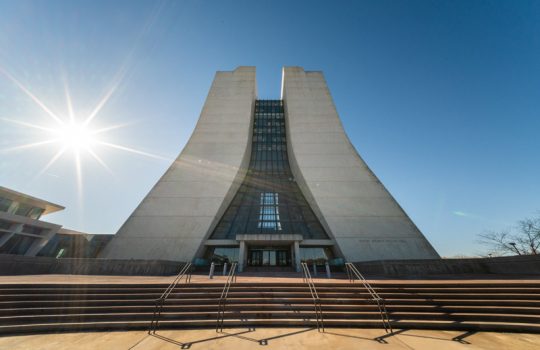A few years ago, George Scheetz saw posters in Champaign, Illinois, advertising an event with an unpronounceable name. One weekend, he decided to sate his curiosity and attend.
Scheetz, the director of Batavia Public Library, came away hooked. In fact, he enjoyed PechaKucha Night so much that he decided to start a chapter in Batavia. On Feb. 16, over 300 people came to Fermilab’s Ramsey Auditorium to see Batavia’s sixth PechaKucha Night.
PechaKucha (pronounced pEH-cha COO-cha), which means “chit-chat” in Japanese, is a worldwide phenomenon in almost 1,000 cities. Part TED talk, part stand-up, PechaKucha covers just about every subject under the sun — and sometimes even inside it. On Thursday, the 10 speakers chatted about topics as varied as protecting bird feeders from raccoons, particle physics and jazz music.
But there’s a catch. PechaKucha isn’t just freeform chatting; each speaker has to abide by a rigid format. Every talk, no matter the subject or the stature of the presenter, consists of 20 slides that each are shown for 20 seconds, for a total of six minutes and 40 seconds.
“I like it because you have to be disciplined,” said Béla Suhayda, a former biology teacher at East Aurora High School and one of the PechaKucha presenters on Thursday. “Educators tend to ramble, so it’s challenging to get a narrative and set the words to pictures.”
Suhayda, who talked about his experience escaping communist Hungary, adapted his book From Tyranny to Liberty into a talk.
The talks also featured long-time Batavia Mayor Jeffery Schielke, who gave a presentation on two of Batavia’s most influential figures, Bill Wood and Eldora Hoover. Schielke, who has a passion for history, reveled in sharing a little-known fact about Wood and Hoover: They were close friends with Iva Toguri, an American-born Japanese broadcaster known as Tokyo Rose.
Denis Kania, St. Charles Park District manager of natural areas and a longtime birdwatcher at Fermilab, gave a presentation about the number of places his birdwatching has taken him.
Fermilab added its own flavor to the event by contributing three of the speakers. Anadi Canepa, Elena Gramellini and Cindy Joe brought their scientific expertise to the stage.

Fermilab physicist Anadi Canepa presents a pie chart illustrating the composition of matter in the universe. Photo: Reidar Hahn
Canepa explained how Fermilab made the discovery of the Higgs boson possible with one of the biggest collaborative efforts in science history, and Gramellini told the tale of neutrinos — elusive particles she compared to sneaky spies.
Joe, an accelerator operator, gave a talk on science as magic, drawing from Arthur C. Clarke’s adage that “sufficiently advanced technology is indistinguishable from magic.”
“It’s like writing a sonnet,” Joe said about preparing the talk. “Part of the beauty is in fitting the limitations, like getting the syllables right for lines of a poem.”
Nancy Karel, a resident of Batavia and member of the PechaKucha organizing committee, said she and her daughters were struck by how “relatable, likable and confident” the three lab members were when speaking about science.
For other members of the audience, it was their first time attending a PechaKucha. Kiersten Lindberg, a travel agent in Batavia, found unexpected connections to the talks.
“I didn’t know what the talks would be,” she said. “My family is Hungarian, so I was unexpectedly moved when I heard [Béla Suhayda’s] story.”
So who can “PechaKucha”? Is it something only mayors and particle physicists can do?
“Anybody is worthy of PechaKucha. Everybody is passionate about something,” Scheetz said. “We’re always looking for speakers — everybody has a story.”
Volume 7 of Batavia’s PechaKucha will be held at Island View Banquets on May 25. Doors open at 6 p.m. and the presentations start at 7.




